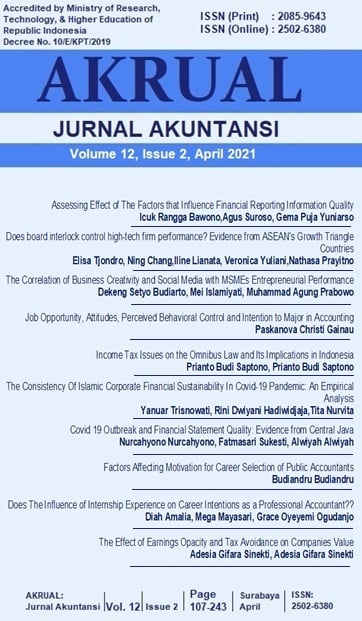Income Tax Issues on the Omnibus Law and Its Implications in Indonesia
DOI:
https://doi.org/10.26740/jaj.v12n2.p164-178Keywords:
income tax, omnibus law, job creationAbstract
This research has two objectives. The first objective is to analyze the issue of income tax policy based on the idea of taxation omnibus law. In 2020, Law No. 36 of 2008 concerning Income Tax was amended twice as stipulated in Law No. 2 of 2020 and Law No. 11 of 2020 (Job Creation Law). The second objective is to analyze the implications of income tax policy changes on taxation practices in Indonesia. This research is a descriptive qualitative study using data collection techniques in documentation and literature studies. The research concludes that the omnibus law policy aims to encourage domestic investment funding. Income tax issues in Law No. 2 of 2020 include lowering the corporate income tax rate and imposing taxes on trade through an electronic system. Besides, the issue of income tax in Law No. 11 of 2020 includes tax subjects' determination, the territorial system's adoption, tax objects' exclusion, and changes to the provisions on dividends. The implication of the change in income tax policy on taxation practices is that taxes distort the economy. The delegation of regulations for reducing income tax rates to the government through government regulations creates legal uncertainty. Thus, it is necessary to have tax regulations with minimal complexity, not overlap, provide legal certainty, and further encourage voluntary tax compliance.References
Abbas, S. ., Klemm, A., Bedi, S., & Park, J. (2012). A Partial Race to the Bottom : Corporate Tax Developments in Emerging Markets. In IMF Working Paper(Vol. 12, Issue 28).
Badan Pusat Statistik. (2020). Berita Resmi Statistik: Pertumbuhan Ekonomi Indonesia Triwulan IV-2019. In Badan Pusat Statistik(Issue 17/02/Th. XXIV). https://www.bps.go.id/pressrelease/2020/02/05/1755/ekonomi-indonesia-2019-tumbuh-5-02-persen.html
Darussalam. (2020). Perlukah Indonesia Menurunkan Tarif PPh Badan?DDTC News. https://news.ddtc.co.id/perlukah-indonesia-menurunkan-tarif-pph-badan 19693?page_y=1333.3333740234375
Darussalam, Septriadi, D., & Kristiaji, B. B. (2020). Policy Note : Omnibus Law Ketentuan & Fasilitas Perpajakan untuk Penguatan Perekonomian.
Dietsch, P. (2015). Catching Capital: The Ethics of Tax Competition. Oxford Univesity Press.
Direktorat Jenderal Pajak RI. (2020). Undang-Undang Nomor 11 Tahun 2020, Klaster Kemudahan Berusaha: Bidang Perpajakan. https://uu-ciptakerja.go.id/wp-content/uploads/2020/11/Klaster-Kemudahan-Berusaha-Bidang-Perpajakan.pdf
Harris, P. (2013). Corporate Tax Law: Structure, Policy, and Practice. Cambridge University Press.
Huibregtse, S., & Sood, A. (2016). Digital Economy Handbook 2016: Tax, Transfer Pricing and Other Legal Aspects of Business Configurations. CreateSpace Independent Publishing Platform.
Kee-hong, B., & Jisok, K. (2017). Does the Economy Ruin the Stock Market or Does the Stock Market Ruin the Economy? Journal of Financial Economics, March, 1.
Kementerian Keuangan RI. (2019). Naskah Akademik Rancangan Undang-Undang Tentang Ketentuan dan Fasilitas Perpajakan Untuk Penguatan Perekonomian.
Kitchenham, B., & Charters, S. (2007). Guidelines for performing Systematic Literature Reviews in Software Engineering. In EBSE Technical Report.
KPMG. (2020). Corporate Tax Rates for 2010-2020. https://home.kpmg/xx/en/home/services/tax/tax-tools-and-resources/tax-rates-online/corporate-tax-rates-table.html
Kumar, A. (2020). Did Tax Cuts and Jobs Act Create Jobs and Stimulate Growth? Early Evidence Using State-Level Variation in Tax Changes. Federal Reserve Bank of Dallas, Working Papers, 2020(2001).
Mankiw, N. G. (2018). Principles of Economics. Cengage Technology.Mooij, R. De, & Saito, I. (2014). Japan's Corporate Income Tax: Facts, Issues, and Reform Options. In IMF Working Paper.
OECD. (2015). Addressing the Tax Challenges of the Digital Economy, Action 1 -2015 Final Report.
OECD. (2017). IMF/OECD Reports for the G20 Finance Ministers.
OECD. (2018). Tax Policy Reforms 2018: OECD and Selected Partner Economies.
OECD. (2019). Tax Policy Reforms 2019: OECD and Selected Partner Economies.
OECD. (2020). Corporate Tax Statistics Database.
Owens, J. (2019). Cooperative Compliance. July. http://pravoisuspilstvo.org.ua/archive/2018/4_2018/part_1/39.pdf
Petticrew, M., & Roberts, H. (2006). Systematic Reviews in the Social Sciences: A Practical Guide. In Systematic Reviews in the Social Sciences: A Practical Guide. Blackwell Publishing.
Riyanto, S., Sumardjono, M. S. W., Sulistiowati, & Hiariej, E. O. S. (2020). Kertas Kebijakan: Catatan Kritis Terhadap UU No 11 Tahun 2020 Tentang Cipta Kerja.
Stewart, M. (2015). Abuse and Economic Substance in a Digital BEPS World. Bulletin for International Taxation (IBFD), June/July.
Stiglitz, J. E. (2000). Economics of the Public Sector. In Economics of the public sector. W.W. Norton & Company.
Suratman, E. (2009). Pengaruh Pajak Penghasilan Terhadap Kesejahteraan: Suatu Model Teoritis. Jurnal Ekonomi Pembangunan: Kajian Masalah Ekonomi Dan Pembangunan, 10(1), 125.
Tax Policy Center. (2017). Analysis of the Tax Cuts and Jobs Act. Tax Policy Center Urban Institute and Brookings Institution. https://www.taxpolicycenter.org/feature/analysis-tax-cuts-and-jobs-act
Tempo. (2019). BKF Kaji Dampak Penurunan Tarif PPh Badan ke Penerimaan Negara. https://bisnis.tempo.co/read/1222826/bkf-kaji-dampak-penurunan-tarif-pph-badan-ke-penerimaan-negara
Wagner, C., Kawulich, B., & Garner, M. (2012). Doing Social Research: A Global Context. In Routledge Handbook of Research Methods in Military Studies. McGraw-Hill Higher Education.
World Bank. (2020). Doing Business 2020: Indonesia. In Doing Business 2020, Economy Profile Indonesia. https://www.doingbusiness.org/en/reports/global-reports/doing-business-2020
Downloads
Additional Files
Published
How to Cite
Issue
Section
License
Copyright (c) 2021 AKRUAL: Jurnal Akuntansi

This work is licensed under a Creative Commons Attribution-NonCommercial 4.0 International License.
 Abstract views: 2260
,
Abstract views: 2260
, PDF Downloads: 1423
,
PDF Downloads: 1423
, PDF Downloads: 0
,
PDF Downloads: 0
, PDF Downloads: 0
PDF Downloads: 0


















